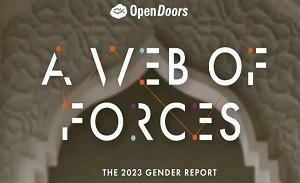Women, men experience religious persecution differently: report

Women and men experience gender-specific forms of religious persecution in violent, insecure nations -- and such persecution as a whole occurs amid a matrix of risk factors, according to a newly published research.
In its annual Gender Report, the nonprofit Open Doors International -- which aids persecuted Christians in more than 70 countries -- found that "in contexts where violence is high, faith-related sexual violence for women and physical violence for men, including lethal violence, are more common."
More than 365 million Christians face significant levels of religious persecution and discrimination -- one in seven worldwide, one in five in Africa, and two in five in Asia, according to Open Doors.
The organization's gender-specific report, released March 5, determined that in already violent, insecure nations, men and boys are more likely to be attacked in "focused, visible and severe" ways for their faith. Along with physical harm, persecuted males are subjected to state, economic and psychological pressures, said the report.
However, religious persecution for women in such environments is "complex, hidden and violent … characterized by sexual violence and forced marriage, as well as by insidious, invisible violence behind closed doors," said the report.
For the study, Open Doors primarily analyzed the top 50 countries on its 2023 World Watch List, an annual ranking of nations where Christians face the most extreme persecution. North Korea, Somalia, Libya, Eritrea and Yemen were named the worst five countries for Christians.
The gender-specific report data, which spanned the period Oct. 1, 2022, to Sept. 30, 2023, was collected from Open Doors' field staff and contributors, as well as external and regional experts, persecution analysts, and existing global research.
The data, which builds on "seven years of gender-specific religious persecution research findings," also shows that for men and women of all ages, "religious persecution is rarely experienced as a single, isolated pressure point," said the report.
Such pressure points for men and boys are typically physical violence, psychological harm, imprisonment, economic harassment and military conscription, said Open Doors.
Clergy members are routinely harassed and threatened with violence as part of such persecution, with the report citing the example of Bishop Rubén Darío Jaramillo Montoya of the Diocese of Buenaventura in Colombia, who since 2021 has been "threatened by armed groups with the use of explosives for denouncing violence and drug trafficking in the region.
"This is one of many such cases," said the report.
Women and girls tend to experience persecution "within the private sphere, often behind closed doors or perpetrated by those already known to them within their existing communities and relationships," said Open Doors.
The top pressure points for females are forced marriage, sexual violence, physical violence, psychological violence and abduction, according to the report.
In general, the persecution women and girls face is "consistently more complex and multifaceted than (that) faced by men and boys," said Open Doors, with the average number of pressure points per country for women and girls in 2024 at 8.4, compared to 6.6 pressure points per country for men and boys.
"This does not speak to the severity of persecution, but does suggest that women and girls especially face a multiplicity of types of pressure and violence," said the report.
Open Doors also noted that the impact of violence and insecurity can last for decades.
"Even when violence formally ceases, men and women of marginalized religious communities still face compounding challenges," the report said. "This can include the legacies of trauma, the challenges of forced displacement settings and continued marginalization when societies restructure, all of which can be impacted by religion and gender."
However, Open Doors noted that what it called "local faith actors" -- such as clergy and religious -- are "uniquely placed to respond to gender- and religious-specific needs," since such persons "are often the first responders in times of crisis," have high trust levels among their communities, and can appreciate the psychological and spiritual needs of those they serve.
Source: https://www.ucanews.com/

